Unit 11 How was your school trip Section B(2a-2c)课件[优质ppt]
2013_版____Unit_11-_How_was_your_school_trip-Section_B_2a-2c
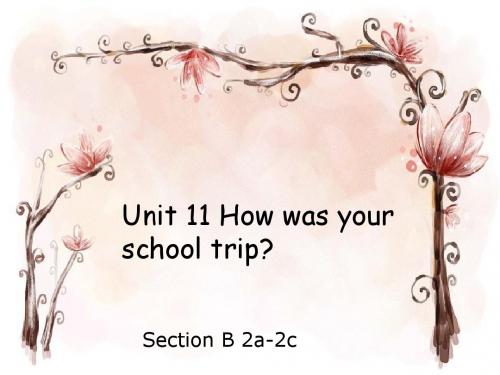
Helen
the trip the train
Jim
exciting
fast
terrible
slow
the museum really interesting big, boring, the gift shop and gifts
dark, too many people
lovely, not expensive
positive [ˈp ɒzətɪv]
attitude
adj. 积极的,肯定的;
[ˈætitju:d] n. 态度,看法;
1. What did Helen visit on the school trip? 2. How did Helen feel about the school trip? 3. How did Helen get to the science museum? 4. What did Helen see along the way?
Read Helen’s diary and answer the following questions.
5. What did Helen learn at the museum?
6. What could robots do with visitors?
7. What did the guide teach them?
8. Did Helen take many photos? 9. What did Helen buy at the gift shop? 10. Who did Helen buy the gifts for?
11. Were the gifts expensive?
June 15th
Unit_11_How_was_your_school_trip_Section_A_2

I. 填入适当的词。 1. She often ____ (go) to the park on goes weekends, but yesterday she went (go) to ____ the zoo. 2. Last week she had (have) fun on a farm. ___ 3. What ___ they __ (do) on the school trip? did do They ____ (ride) horses and _______ rode climbed (climb) the mountains.
3. I was very busy last week. (改否定
句和一般疑问句)
I wasn’t very busy last week. ______ _____ Were you very busy last week? 4. There was some orange in the cup. (变一般疑问句) _____ there ____ orange in the cup? any Was
was 4. How ____ their school trip? It was interesting. ___
___ she go (go) fishing? __ Did Yes, she did. 5. Did Li Ming ____ (pick) any ___ pick
strawberries? No, he didn’t.
Groupwork
Make a survey. Ask your partners what they did last week. Then give a reporter. A: Hi, Carol. What did you do last weekend? B: I watched TV, and then I went fishing with my father. A: How was your last weekend? B: It was boring.
人教版英语七年级下册教案:Unit11 How was your school trip? Section B(3a-Self Check)
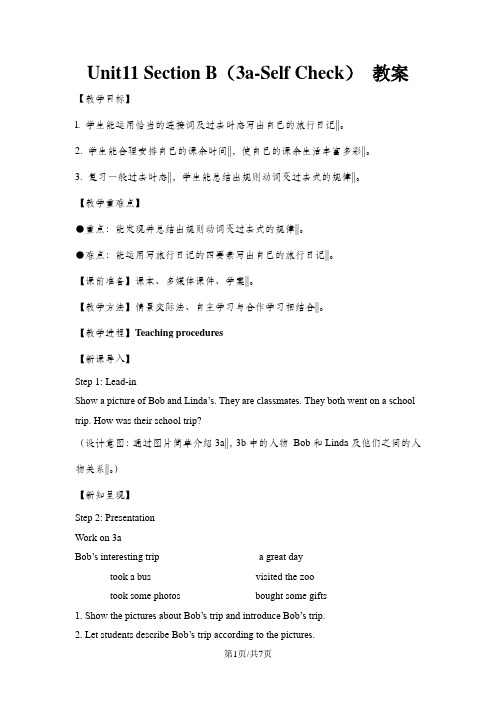
Unit11 Section B(3a-Self Check)教案【教学目标】l. 学生能运用恰当的连接词及过去时态写出自己的旅行日记||。
2. 学生能合理安排自己的课余时间||,使自己的课余生活丰富多彩||。
3. 复习一般过去时态||,学生能总结出规则动词变过去式的规律||。
【教学重难点】●重点:能发现并总结出规则动词变过去式的规律||。
●难点:能运用写旅行日记的四要素写出自己的旅行日记||。
【课前准备】课本、多媒体课件、学案||。
【教学方法】情景交际法、自主学习与合作学习相结合||。
【教学进程】Teaching procedures【新课导入】Step 1: Lead-inShow a picture of Bob and Linda’s. They are classmates. They both went on a school trip. How was their school trip?(设计意图:通过图片简单介绍3a||,3b中的人物Bob和Linda及他们之间的人物关系||。
)【新知呈现】Step 2: PresentationWork on 3aBob’s interesting trip a great daytook a bus visited the zootook some photos bought some gifts1. Show the pictures about Bob’s trip and introduce Bob’s trip.2. Let students describe Bo b’s trip according to the pictures.3. Look at the pictures and complete Bob’s diary.(设计意图:通过图片及一些短语介绍并描述Bob的旅行||,为补全Bob的旅行日记作了铺垫||,同时也降低了难度||,也符合学生的认知规律——由输入到输出||。
新目标版英语七年级下册Unit11Howwasyourschooltrip?(SectionA)含答案
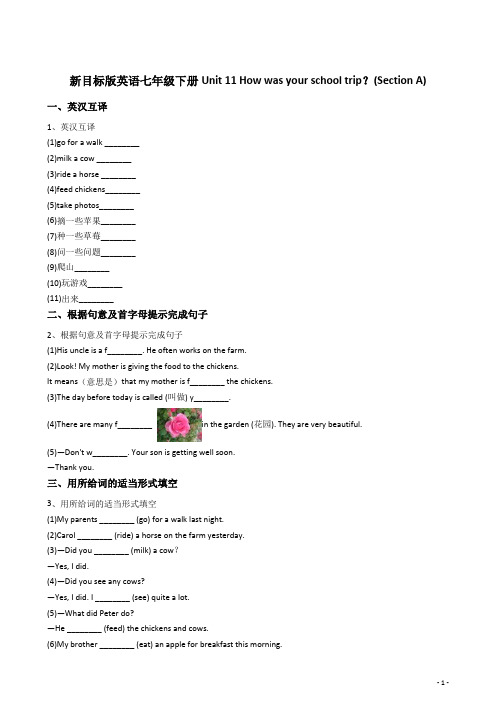
新目标版英语七年级下册Unit 11 How was your school trip?(Section A)一、英汉互译1、英汉互译(1)go for a walk ________(2)milk a cow ________(3)ride a horse ________(4)feed chickens________(5)take photos________(6)摘一些苹果________(7)种一些草莓________(8)问一些问题________(9)爬山________(10)玩游戏________(11)出来________二、根据句意及首字母提示完成句子2、根据句意及首字母提示完成句子(1)His uncle is a f________. He often works on the farm.(2)Look! My mother is giving the food to the chickens.It means(意思是)that my mother is f________ the chickens.(3)The day before today is called (叫做) y________.(4)There are many f________ in the garden (花园). They are very beautiful.(5)—Don't w________. Your son is getting well soon.—Thank you.三、用所给词的适当形式填空3、用所给词的适当形式填空(1)My parents ________ (go) for a walk last night.(2)Carol ________ (ride) a horse on the farm yesterday.(3)—Did you ________ (milk) a cow?—Yes, I did.(4)—Did you see any cows?—Yes, I did. I ________ (see) quite a lot.(5)—What did Peter do?—He ________ (feed) the chickens and cows.(6)My brother ________ (eat) an apple for breakfast this morning.(7)John ________ (study) English last Friday.(8)There ________ (be) two books on the table five minutes ago (以前).(9)They ________ (play) basketball yesterday afternoon.(10)The man ________ (stop) his car and ________ (buy) some strawberries yesterday morning.四、单选题4、It ___________ sunny yesterday. It ___________ rainy today.A、is; isB、is, wasC、was, isD、was; was5、—Jack, is there ___________ in today's newspaper?—No, nothing.A、anything importantB、something importantC、important anythingD、important something6、Yesterday my father ___________ his friends ___________ Tian'anmen Square (天安门广场).A、shows; aboutB、shows, aroundC、showed; aboutD、showed; around7、Could you say it again? I can't understand ___________ you are talking about.A、howB、whenC、whatD、which8、—___________ he go to Central Park?—Yes, he did.A、DidB、DoC、DoesD、Is9、It ___________ last week that the haze(雾霾) in Beijing caused many problems.A、reportsB、reportedC、is reportedD、was reported10、—Did Jim and Sue go to the party?—No, they ___________.A、didB、didn'tC、wereD、weren't11、—Do you need a new dictionary, Susan?—No, Mum. My uncle ___________ me one yesterday.A、buyB、buysC、boughtD、is buying12、—Who is it?—Me. I ___________ this photo when I was four.A、tookB、takesC、takeD、am taking13、Last Sunday, Carol and his friends ___________ some apples and ___________ them home.A、pick; tookB、picked; tookC、picked; takeD、pick, take五、根据汉语提示完成句子14、根据汉语提示完成句子(1)Don't ________(担心). The ________(太阳)is coming out.(2)My classmate helped ________(农民)________(种植)rice and ________(采;摘)apples last Sunday.(3)There are ________ ________ ________ ________ ________(相当多的马)on the farm.(4)—Did you learn ________ ________(优秀的东西)in the ________(农村)?—Yes, I did.(5)She was very ill, but ________(幸运地)she is now out of danger.六、按要求改写句子15、按要求改写句子(1)My school trip was pretty great last weekend.(对画线部分提问)________ was ________ school trip last weekend?(2)The twins played computer games yesterday.(改为一般疑问句,并作否定回答)—________ the twins ________ computer games yesterday?—No, ________ ________.(3)I saw cows last week. (改为一般疑问句,并作肯定回答)—________ you ________ cows last week?—Yes, ________ ________.(4)There were some chickens on the farm.(改为一般疑问句,并作肯定回答)—________ ________ ________ chickens on the farm?—Yes, ________ ________.(5)My family went fishing last Sunday.(对画线部分提问)________ ________ ________ family ________ last Sunday?七、补全对话16、补全对话Jim: Hey, Sally! I didn't see you last Saturday. Where were you?Sally:(1)________Jim: Why?Sally:(2)________Jim: Like what?Sally: Well, I cleaned my room. And I did my homework.Jim:(3)________Sally: Yes. How about you? What did you do?Jim:(4)________Sally: Wow! You had fun.Jim:(5)________八、阅读理解17、阅读理解We went on a school trip to New York. We had a good time. There were twenty-four students and three teachers. It was a five-day trip, and we visited some attractions (景点).We stayed at a hotel and six people had one room. We often had our meals out of the hotel—there were a number of restaurants nearby. We went around the city, and we were really given quite a lot of freedom(自由). So long as (只要) we were back to our rooms by 10 p.m., we could go where we wanted to. I was surprised at how safe I felt walking around New York in small groups. My friends and I enjoyed ourselves on the trip. I would like to advise it to anyone. If you decide to go, you will have a great time!(1)What is the message mainly about?A、A picnicB、A school trip.C、Ice-skatingD、Shopping.(2)How many people went on the trip?A、SixB、TenC、Twenty-fourD、Twenty-seven.(3)According to the passage, which of the following is NOT true?A、Six students lived in one room in the hotel.B、Students had to get back to the hotel by 10 pm.C、Students spent five days on the trip.D、Students had their meals in the hotel.(4)What did the author think of the trip?A、He had a good time.B、He wanted more freedom on the trip.C、He didn't want to come back.D、He was surprised at how dangerous New York was.(5)What does the underlined word "advise" mean in Chinese?A、说B、推荐C、建议D、喜欢答案解析部分一、英汉互译1、【答案】(1)去散步(2)给奶牛挤奶(3)骑马(4)喂鸡(5)照相(6)pick some apples(7)grow some strawberries(8)ask some questions(9)climb the mountains(10)play games(11)come out【解析】【分析】考查短语的英汉互译,注意名词要用复数形式。
Unit11Howwasyourschooltrip(SectionB3a-SelfCheck)教学案(人教新目标七年级下册)
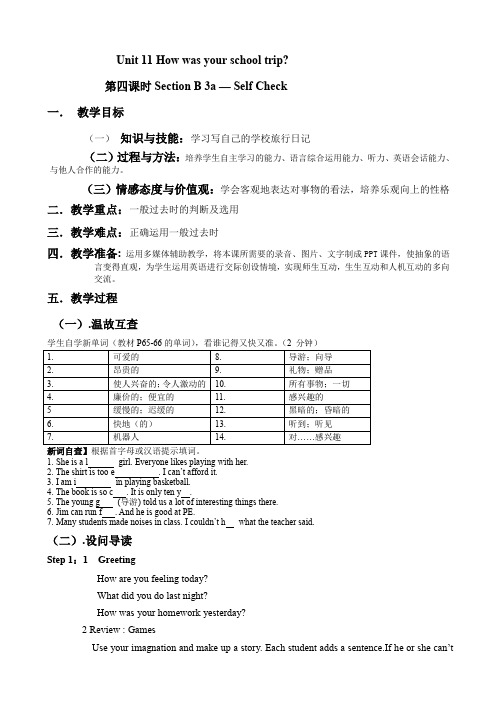
Unit 11 How was your school trip?第四课时Section B 3a — Self Check一.教学目标(一)知识与技能:学习写自己的学校旅行日记(二)过程与方法:培养学生自主学习的能力、语言综合运用能力、听力、英语会话能力、与他人合作的能力。
(三)情感态度与价值观:学会客观地表达对事物的看法,培养乐观向上的性格二.教学重点:一般过去时的判断及选用三.教学难点:正确运用一般过去时四.教学准备:运用多媒体辅助教学,将本课所需要的录音、图片、文字制成PPT课件,使抽象的语言变得直观,为学生运用英语进行交际创设情境,实现师生互动,生生互动和人机互动的多向交流。
五.教学过程(一).温故互查新词自查】根据首字母或汉语提示填词。
1. She is a l girl. Everyone likes playing with her.2. The shirt is too e. I can’t afford it.3. I am i in playing basketball.4. The book is so c . It is only ten y.5. The young g (导游) told us a lot of interesting things there.6. Jim can run f . And he is good at PE.7. Many students made noises in class. I couldn’t h what the teacher said.(二).设问导读Step 1:1 GreetingHow are you feeling today?What did you do last night?How was your homework yesterday?2 Review : GamesUse your imagnation and make up a story. Each student adds a sentence.If he or she can’tadd a sentence,he or she must sing an English song.Step 2 : Preparation1.3a Look a t the pictures of Bob’s school plete his diary entry.2. 3b Linda is Bob’s classmate. Complete her diary entry.Step 2 : Writing3c Now write a diary entry for your own school trip.Explain if you liked it or didn’t like it a nd why.Step 3 : Self-check1 Write more verbs and their past forms in each group.2 Complete the conversations with the correct forms of the verbs in the box.3 Check the answers4 Grammar: The Simple Past Tense(三)自我检测Mike’s summer vacationOn July 18th,2012, Mike and his parents went to Qingdao, a city in Shandong for summer vacation. Qingdao is a beautiful city with sea.It was about 12:00 when they arrived there on the first day. They found a hotel and had a short rest. It was really hot and they decided to go to the beach. At about 3:30 pm, they got to the beach. There were many people there. Some were lying on the beach and many children were playing in the water. Mike was playing with them and he was very happy. His parents also felt relaxed. About two hours later, they went back to the hotel.On the second day, it rained all day. Mike visited the history museum with his father and his mother went shopping.On July 20th, they went to Laoshan Mountain in the morning and took a bus home in the afternoon. They were tired but happy.( ) 1. Where did Mike’s family go on vacation? A. To Shanghai. B. To Tianjin.C. To Qingdao.( ) 2. What did Mike’s father do on July 19th?A. He swam in the sea.B. He visited the history museum.C. He went shopping with Mike’s mother.( ) 3.How long was their vacation? A. One day. B. Two days. C. Three days.( ) 4. How did they go back home? A. By train. B. By bus. C. By plane.( ) 5. Which of the following is true?A. It rained on July 19th.B. They went shopping on July 20th.C. Mike didn’t play in the water on the first day.(四).巩固训练:一、阅读理解。
初中英语 七年级下册 Unit11 How was your school trip

练习:判断下列句子是否用一般过去时。 I got up at six thirty yesterday morning. He had a good time last summer? He was there five minutes ago. The little girl was born in 2008. When Tony was young, his parents passed away. I saw him at the gate of the school just now.
reply on the right.
Dear Bill, How _w_a_s_ (is) your school trip yesterday? _D_i_d_ (Do) you _g_o_ (go) to the zoo? _D__id__ (do) you take any photos? _D_i_d_ (Do) you _s_e_e_ (see) any interesting animals? I _w_e_n_t_ (go) to the zoo last year and it _w_a_s_ (is) a lot of fun. Jim
类别 中间去e,词尾加t
词尾的d变成t 过去式以ought/ aught结尾 be动词的过去式
例词 keep→kept feel→felt sleep→slept spend→spent send→sent lend→lent think→thought teach→taught buy→bought
We _a_t_e_ (eat) our lunch under some trees and _p_la_y_e_d_ (play) some games after that. But at about two o’clock, it _g_o_t (get) very cloudy and we _w_o_r_r_ie_d_ (worry) it would rain. Luckily, it _d_id_n__’t_ (do not), and the sun _c_a_m__e_ (come) out again!
2019-2020年人教版英语七年级下册Unit 11 How was your school tr
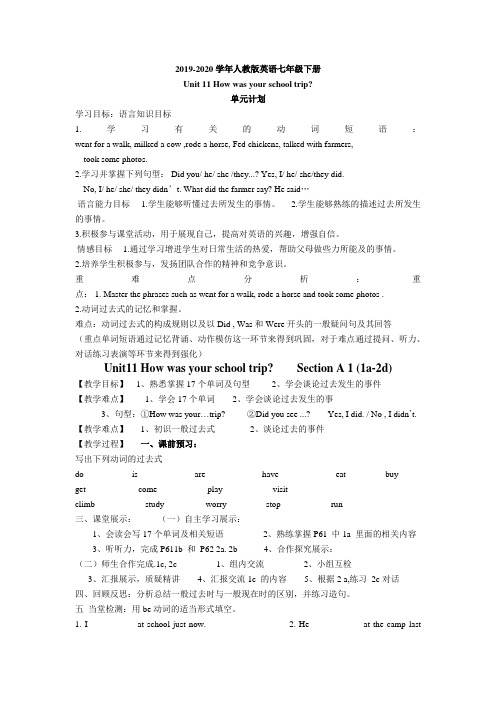
2019-2020学年人教版英语七年级下册Unit 11 How was your school trip?单元计划学习目标:语言知识目标1.学习有关的动词短语:went for a walk, milked a cow ,rode a horse, Fed chickens, talked with farmers,took some photos.2.学习并掌握下列句型: Did you/ he/ she /they...? Yes, I/ he/ she/they did.No, I/ he/ she/ they didn’t. What did the farmer say? He said…语言能力目标 1.学生能够听懂过去所发生的事情。
2.学生能够熟练的描述过去所发生的事情。
3.积极参与课堂活动,用于展现自己,提高对英语的兴趣,增强自信。
情感目标 1.通过学习增进学生对日常生活的热爱,帮助父母做些力所能及的事情。
2.培养学生积极参与,发扬团队合作的精神和竞争意识。
重难点分析:重点: 1. Master the phrases such as went for a walk, rode a horse and took some photos .2.动词过去式的记忆和掌握。
难点:动词过去式的构成规则以及以Did , Was 和 Were 开头的一般疑问句及其回答(重点单词短语通过记忆背诵、动作模仿这一环节来得到巩固,对于难点通过提问、听力、对话练习表演等环节来得到强化)Unit11 How was your school trip? Section A 1 (1a-2d)【教学目标】1、熟悉掌握17个单词及句型2、学会谈论过去发生的事件【教学难点】1、学会17个单词2、学会谈论过去发生的事3、句型:①How was your…trip? ②Did you see ...? Yes, I did. / No , I didn’t. 【教学难点】1、初识一般过去式2、谈论过去的事件【教学过程】一、课前预习:写出下列动词的过去式do______ is_______ are_______ have_______ eat____ buy_____ get______ come ______ play _____ visit______climb ______ study _____ worry_____ stop _____ run_____三、课堂展示:(一)自主学习展示:1、会读会写17个单词及相关短语2、熟练掌握P61 中1a 里面的相关内容3、听听力,完成P611b 和P62 2a. 2b4、合作探究展示:(二)师生合作完成.1c, 2c 1、组内交流2、小组互检3、汇报展示,质疑精讲4、汇报交流1c 的内容5、根据2 a,练习2c对话四、回顾反思:分析总结一般过去时与一般现在时的区别,并练习造句。
人教版英语七年级下册Unit_11_How__was_your_school_trip_?_Section__B
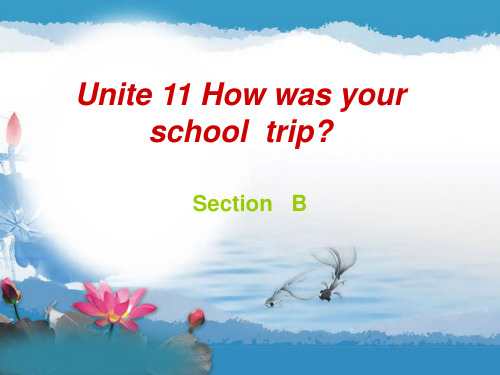
2c Complete the chart. How do Helen and
Jim describe these things?
Helen the trip the train Jim
1c Listen again. What did Jane and Tony
do on their last school trip? Check (√) Tony or Jane.
went to the countryside climbed went to saw some drew a an art paintings pictures mountain museum
watch flowers
watched flowers
pick strawberries picked strawberries
1a Match the activities with the pictures 1.go to the zoo __ 4. climb a mountain__ 2.visit a museum__ 5. visit a fire station__ 3.ride a horse__ 6.go fishing__
e
a
d
b
f
c
1a Match the activities with the pictures 1.go to the zoo _a_ 4. climb a mountain_e_ 2.visit a museum_c_ 5. visit a fire station_d_ 3.ride a horse_b_ 6.go fishing_f_
II. 译出下列短语 去散步 去购物 去钓鱼 挤奶牛 骑马 骑自行车 喂小鸡 和某人谈话 拍照
七年级英语下册Unit 11 How was your school trip SectionA Period 1(1a-2c)

1. ____ Did he see any cows on the farm? Yes, he did. 2. Did he milk a cow on the farm? No, he ______. didn’t 3. Were the strawberries good? Yes, they were 4. Did you see any cows? Yes, I did. I saw ___ quite a lot. 5. I ___ fed the chickens last week.
1a Match the phrases with the pictures. went for a walk e milked a cow b rode a horse a fed chickens c talked with a farmer f took some photos d
1b Listen and circle the three things Carol did on her school trip in 1a.
Learning aims:
• learn new words & phrases: • new sentences: (1)--- How was your school trip? --- It was great. (2)学会用 Did you ...? Yes,I did./ No,I didn't. 描述过去的事情。 Practice listening & speaking skills.
went for a walk milked a cow rode a horse fed chickens talked with a farmer took some photos
Unit_11_How_was_your_school_trip_Section_B_1a-2c

1a Match the activities with the pictures.
1. go to the zoo __ 2. visit a museum __ a c 3. ride a horse __ 4. climb a mountain __ b e 5. visit a fire station __ 6. go fishing __ d f
1c Listen again. What did Jane and Tony do on their last school trip? Check√ Tony or Jane.
went to climbed went to saw drew some pictures the a an art countryside mountain museum paint ings Tony Jane
选择填空 B 1. ____ Emily at her aunt’s last night? A. Is B. Was C. Did C 2. _____ he sleep late last night? A. Is B. Was C. Did 3. My mother _______ some cakes for us C last night. A. makes B. make C. made 4. — Did they take any photos? — _______. A A. No, they didn’t B. No, they did C. No, they aren’t
7. watch________ watched
I. 用适当的词填空
1. How was your school trip? It was great. ___ 2. How _____ you yesterday? were 3. Today is Monday. Yesterday ___ was Sunday. 4. What did you do the day before ___ yesterday? 5. ____ you ride a horse last week? Did
初中英语人教版七年级下册《Unit 11 How was your school trip Sect

They weclohreveea_l_py_.___ and
terrJibimle's&idbeoaring
The train was _s_lo__w___. He's not _in_t_e__re__sted in robots.
New words
dark
dark作形容词,意为“黑暗的”,反义词为 bright,意为“光明的” 天快黑了。 It' s getting dark. [拓展]①dark作形容词,还可意为“(色彩)深 的”;反义词为 light,意为“(色彩)浅的” 我爱好深蓝色。 I like dark blue. ②dark作名词,意为“黑暗;暗处” 她在黑暗中什么也看不见。 She could see nothing in the dark.
Warm-up
S1. WhMS2. WhEenacdhidstyuoduegnot tahdedres?a sentence.
S3. How was the weather there?
S4. WhSohdaidreyyoouugroswtoitrhy.?
New words
fast
fast作副词,意为“快地” 反义词为slowly“慢地 这个男孩跑得快。 The boy runs fast. fast用作形容词,意为“快的” 反义词为slow“慢的 我们可以乘快车。 We can take a fast train.
New words
guide
guide可数名词,意为“导游;向导” 导游带我们参观了博物馆。 The guide showed us around the museum. [拓展] guide及物动词,意为“带领;引导” 她领着她的学生过马路。 She guided her students across the road.
人教版新目标七年级下Unit11 How was your school trip Section a1课件

play computer
played computer
What did you/he/she/they/Mr. Green do last weekend?
studied for the test
watched TV
did some reading
had a party
played tennis
3. 情态动词的一般过去时态 肯定句式:主语 + 情态动词的过去式 +v原型+ 其它. 否定句式:主语 + 情态动词的过去式 + not +v原型 + 其它. 一般疑问句:情态动词的过去式 + 主语 + v原型+ 其它? could , may→______, might 注:情态动词的过去式:can→_____ would ,shall-______ must ,will-______ should must→_____ 。 4.特殊疑问句式:特殊疑问词+ 一般疑问句? 1)特殊疑问词+was/were+主语+其他? 2)特殊疑问词+情态助动词过去式+主语+v.原形+其他? 3)特殊疑问词+did+主语+v.原形+其他? 1)Why ____ was ____he late for school last Monday? 他上周一为什么上学迟到了? do 2)What _____ could ______she ____twenty years ago? 20年前她能做什么? Where did go yesterday?昨天你去哪了? 3) _____ _____you_d time yesterday. 1. They ______ watch (not watch) TV last night. 2. They didn’t ___________ Did you _____ go (go) to the park yesterday? 3. ____ did / _____, No I didn’t. Yes, I____. 注意:1. did和didn’t 是构成一般过去时的助动词, 其特点是要在其后跟动词的原形。 2. 实意动词do的一般过去时 I do my homework every day.(用yesterday改写句子) did I ____my homework yesterday. didn’t do my homework yesterday.(否定句) I _________ do your homework yesterday? ____ you ____ Did Yes ,I did. /No, I didn’t.(一般疑问句)
Unit_11_How_was_your_school_trip_Section_B_3a--self_check

home, but tomorrow he is ______ (take) a taking
bus there.
按照要求完成句子, 每空一词。
1. Peter did his homework last night. (改为否 定句) didn’t do Peter ______ ______ his homework last night. 2. There were some children in the park just now.(变一般疑问句,并进行否定回答) Were any —_____ there ______ children in the park just now? there _______. —No, ______ weren’t
Unit 11 How was your school trip?
Section B
Period 2 (3a-Self Check)
翻译下列短语和句子。 1. 到达那儿 get there 2. 下棋 play chess play the piano play basketball
弹钢琴
打篮球
3. 对感兴趣 be interested in all in all 4. 总之
1 Write more verbs and their past forms in each group. climbclimbed
pick-picked milk-milked play-played stay-stayed want-wanted
arrivearrived
hope-hoped live-lived movemoved dancedanced
Unit 11 . How was your school tripSection B 2

2 Complete the conversations with the correct forms of the verbs in the box.
have do swim go be see feed 1. A: I went to the countryside this summer. B: Really? How ____ was the trip? A: It was ___ great! B: What ___ did you __ do there? A: I fed ___ the chickens and _____ swam in a river.
He took some photos and bought some gifts.
3a Look at the pictures of Bob’s school trip. Complete his diary entry.
June 23rd Yesterday my school visited the zoo. It was really interesting _________. We went there by bus. At the zoo, I saw a lot of _______ animals and I took some photos. My classmates and I also went to the ________ gift shop and bought some _____. gifts It was a great day.
hope-hoped worrylive-lived worried move-moved cry-cried dancedanced
stopstopped
人教七年级英语下《Unit11HowwasyourschooltripPeriod4》
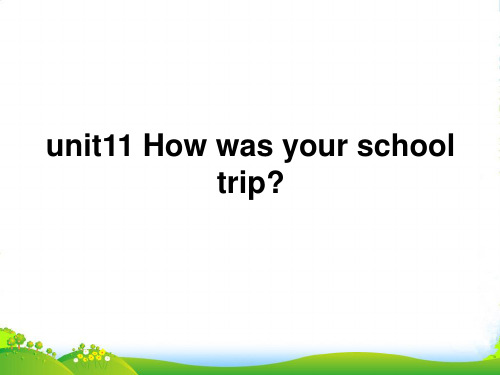
5. My father often
(swim)in this river when he was
young.
答案: 1. was 2. Were 3. visited 4. rode 5. swam
Ⅱ. 句型转换
1. She was a dancer 10 years ago. (改为否定句)
She
的消息时, 每个人激动不已。excited人感到兴奋, 修饰人;
exciting令人兴奋的, 指物体令人兴奋, 修饰物, 故选B。
【习作在线】 四练笔巩固--1师友练笔
请根据下表提示, 以“A Great School Trip”为题写一篇
英语短文, 介绍七年级一班去泰山(Mount Tai)校游的情况。
3. 昨天他参加了学校旅游。
He
a school trip yesterday.
4. 母亲教我如何做早饭。
My mother
me
cook breakfast.
5. 他一点也不喜欢这次旅行。
He
like the trip
.
答案: 3. went on 4. taught; how to 5. didn’t; at all
19. along the way 沿线
20. after that 之后 21. buy sth. for sb. 为某人买某物
22. all in all 总的来说 23. take a / the train 乘火车
一、知识回顾 ---2. 教师点评
【语法总结】一般过去时 (一)一般过去时的定义 一般过去时表示过去某个时间发生的动作或存在
→
(adv. )幸运地; 好运地
7. paint(v. )
Unit 11 How was your school trip(讲义及答案)
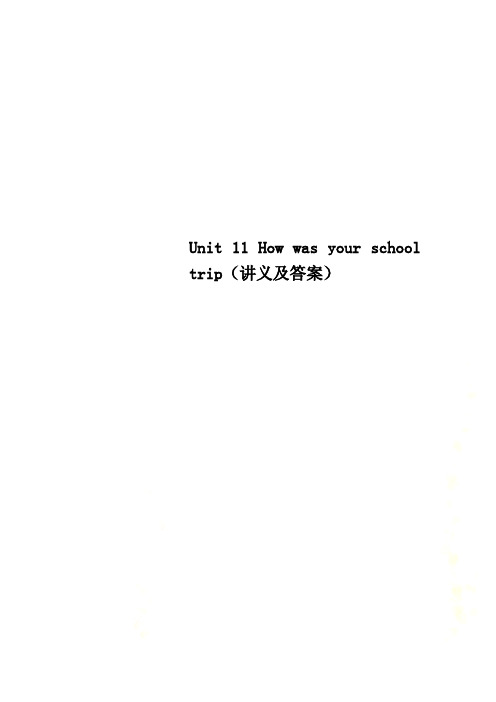
Unit 11 How was your school trip(讲义及答案)Unit 11 How was your school trip?(讲义)Part 1 Words and Expressionsmilk /mɪlk/ v. 挤奶cow /kaʊ/ n. 奶牛milk a cow 挤奶horse /hɔː(r)s/ n. 马ride a horse 骑马feed /fiːd/ v.(fed /fed/)喂养;饲养feed chickens 喂鸡farmer /'fɑː(r)mə(r)/n. 农民;农场主quite /kwaɪt/ adv. 相当;完全quite a lot (of…) 许多anything /'enɪθɪŋ/pron.(常用语否定句或疑问句)任何东西;任何事物grow /grəʊ/ v. (grew/ɡruː/)种植;生长;发育farm /fɑː(r)m/ n. 农场v. 务农;种田pick /pɪk/ v. 采;摘excellent /'eksələnt/adj. 极好的;优秀的countryside /'kʌntrisaɪd / n. 乡村;农村in the countryside 在乡下;在农村yesterday /'jestə(r)di/adv. 昨天flower /'flaʊə(r)/n. 花worry /'wʌrɪ/ v. & n. 担心;担忧luckily /'lʌkɪli/ adv. 幸运地;好运地sun /sʌn/ n. 太阳museum /mjuː'ziəm/n. 博物馆fire /'faɪə(r)/n. 火;火灾fire station 消防站painting /'peɪntɪŋ/n. 油画;绘画exciting /ɪk'saɪtɪŋ/adj. 使人兴奋的;令人激动的lovely /'lʌvli/ adj. 可爱的expensive /ɪk'spensɪv/ adj. 昂贵的cheap /tʃiːp/ adj. 便宜的;廉价的slow /sləʊ/ adj. 缓慢的;迟缓的fast /fɑːst/ adj. & adv. 快地(的)slow & fastadj. 缓慢的;迟缓的adj.& adv. 快地(的)adj.a slow driver a fast walkerI missed the fast train and had to get the slow one.adv.slowly & fastCan you speak slowly? The boy runsfast.interesting adj. 感兴趣的be interested in 对……感兴趣I am interested in music and my brother is interested in sports. We had a great time on the farm yesterday. We were interested in milking the cow.be interested in 主语通常是人,接动词时用动词的-ing 形式。
Unit11 How was your school trip Section_A_
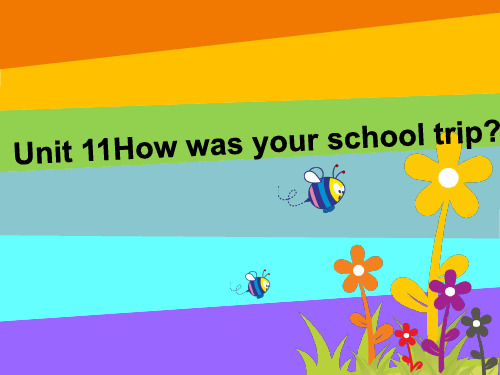
ate our lunch
played some games
2a Listen and check the questions you hear.
What did the farmer say? Did you grow any apples? √ What did you see? √ Do they grow apples? Did you learn anything? Did you eat them? √ Did you ask him any questions? √ Were they good?
相当多
quite a little +不可数名词
e.g. 1)We drank _q_u_i_t_e_a__l_oit_tl_oe_f__wine.我们喝了不少酒。
2) I saw _q_u_i_t_e_a__lf_oe_tw_o_f cows.我看到了相当多的奶牛。 3) I play tennis _q__u_it_e__a_l_o_t_in the summer.
【2011四川德阳】– Do you know who cleaned the blackboard, Tina?
-- Yes. John _____.
A. do
B. does
C. did
答案: C
【解析】本题考查时态的运用。擦黑板是已 经过去发生的动作。在回答时,也应用过去 时态,应排除A、B,故选C。
What did he do on the farm? He rode a horse. Did he ride a horse? Yes, he did.
Did he milk a cow? Yes, he did. He milked a cow.
七下英语U11How was your school trip Section A 1a-2c

Unit 11 How was your school trip?
Section A 1a-2c
When we talk about something in the past, we use simple past tense.
Last year, I went to Thailand. I visited many beautiful temples. I saw different animals.
2c. Ask and answer questions about Carol’s visit to the farm.
A: How was Carol's school trip? B: It was interesting. A: What did she do? B: She talked with farmers.
A: Did Carol _r_i_d_e_a__h_o_r_s_e___? B: No, she_d_i_d_n_'_t __. A: Did Carol _m__i_lk__a_c_o_w_____? B: Yes, she _d_i_d_.
1c. Ask and answer questions about Carol’s school trip.
talk with a farmer ['fɑːmə] n. 农民 He talked with a farmer in 2019.
take some photos We took some photos two days ago.
ride a horse [hɔːs] n. 马
feed [fiːd] v. 喂养 chickens
- 1、下载文档前请自行甄别文档内容的完整性,平台不提供额外的编辑、内容补充、找答案等附加服务。
- 2、"仅部分预览"的文档,不可在线预览部分如存在完整性等问题,可反馈申请退款(可完整预览的文档不适用该条件!)。
- 3、如文档侵犯您的权益,请联系客服反馈,我们会尽快为您处理(人工客服工作时间:9:00-18:30)。
1. I didn’t know they could play chess with u
play 后面接球类、棋类、牌类等体育 运动名称时,前面不加冠词,如: play basketball, play chess, play cards。 play后接乐器时,前面则加定冠词, 如: play the violin, play the piano。
Read Helen’s and Jim’s diary entries again and find out the verbs in the past tense.
went, visited, was, got, saw, learned, could ,taught, took, bought, were
2. Then the guide taught us how to make a model robot. teach sb. to do sth. 教某人做某事 teach sb. sth. 教某人某事 teach oneself 自学
3. All in all, it was an exciting day. all in all 总的来说,总而言之 an exciting day 让人兴奋的一天 exciting是形容词, 后接名词,意思是 “让人兴奋的,使人兴奋的”,多形 容物。 excited也是形容词, 多用来形容人感到, 同类的有interesting, interested; boring, bored。
2. How do they feel about the trip?
Helen thought the trip was really interesting. But Jim thought the trip was terrible.
2c Read the diaries again and complete the chart. How do Helen and Jim describe these things?
2a Do the following words describe good things
or bad things? Put a √ for good and an × for bad. Leave a blank if they can mean both.
___ interesting ___ difficult ___ lovely
I am interested in collecting stamps. 我对收集邮票很感兴趣。 book,you must read it. 那是一本很有意思的书,你一定要读读。
用interesting / interested 填空。
The book is very _in_t_e_r_e_s_ti_n_g. Most of the teachers are i_n_t_e_re_s_t_e_d_in it. .
___ slow ___ exciting ___ boring ___ cool ___ hot ___ lucky ___ large___ expensive __ terrible ___delicious ___ great ___ cheap ___ fast
science museum
interesting
so fast useful
The gifts weren’t expensive. but lovely
terrible so hot
big and boring dark too many people
The things in the gift shop were so expensive.
2b Read Helen’s and Jim’s diary entries and answer the questions. 1. Did Helen and Jim go on the same trip? Yes, they did. They went on the same trip.
例如: 3 hours’ walk 三小时的路程 five minutes’ walk 五分钟路程 two miles’ distance 两英里的距离
5. Everything was about robots. everything 作主语,谓语动词用单数。
6. I’m not interested in that. be interested in 对…感兴趣
7. it was difficult to take photos. It is + adj. (for sb.) to do sth. (对某人 来说)做 … 怎么样 e.g. 对我来说骑车上学是很容易的。 It is easy for me to go to school by
8. There were also too many people. too many加可数名词 too many student too much加不可数名词 too much water
• an exciting day 让人兴奋的一天 • exciting物“让人兴奋的,使人兴奋的”, • excited 人感到兴奋的, • 同类 • interesting, interested; • boring, bored。
辨析:interested / interesting
interested be interested in 某人对……是感兴趣的; interesting 某物有趣的;有意思的
4. today’s school trip 表示有生命的东西的名词及某些表示
时间、距离、星球、世界、国家等无生命 的东西的名词后加 ’s来表示所有关系, 叫做名词所有格。
例如: men’s room 男厕所 a mile’s distance 一英里的距离
但如果该名词是以-s或-es接尾,则只在该 名词后加“’”来构成所有格。
